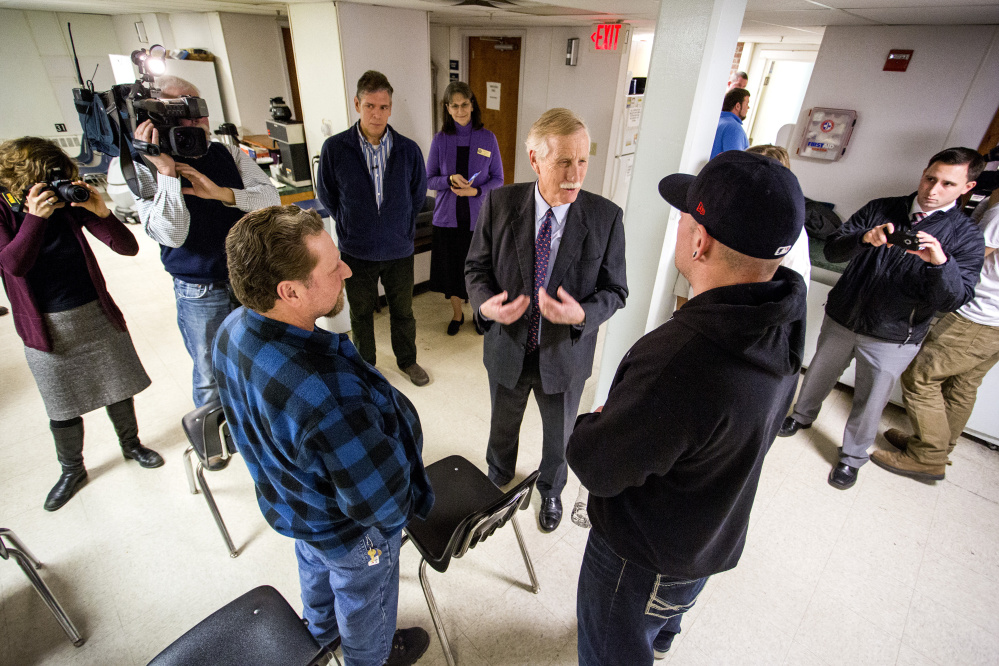Sen. Angus King, in response to the nationwide opioid crisis, is planning to introduce legislation to raise a federal limit on the number of beds available at drug and alcohol treatment centers.
In a visit Monday to the Milestone Foundation on India Street, one such treatment center that is limited to 16 beds each at its detoxification and in-patient treatment facilities, King said the limit is “arbitrary” and presents a barrier to treatment.
“A few years ago, less than 5 percent of Milestone’s patients were seeking treatment for heroin addiction,” King said in a statement. “Today, that number is closer to 50 percent. But while the need has increased, the capacity has not because of outdated federal laws. Raising the limit on treatment beds is just one of many steps we can take to give Milestone and other treatment facilities the support they need to help more people.”
King hasn’t released a draft of the legislation, and hasn’t specified what new limit on treatment beds he would suggest.
Bob Fowler, Milestone’s executive director, said raising the cap could be helpful, but that it would address only one aspect of the complex patchwork of services that addicts must traverse to get the recovery care they need.
Without wider access to recovery services, such as through expanding MaineCare coverage, a seamless set of programs that can address a patient’s needs from the time of detoxification to re-entering the community, longterm recovery can be elusive.
“It’s a jigsaw puzzle and you’re really trying to cobble pieces together,” Fowler said.
Milestone is a private non-medical institution, a regulatory category that can include many types of operations providing a variety of services, including addiction treatment, all of which are funded by MaineCare.
The Department of Health and Human Services, which licenses private nonmedical institutions, didn’t immediately respond to a request for information on how many facilities in Maine might be affected by a change in the cap or how many beds are now available.
The bed limit has existed as a federal regulation for years, said Steve Cotreau, manager of the Portland Community Recovery Center, which offers peer recovery support programs for addicts, and was put in place following the nationwide movement away from the institutionalization of the mentally ill and other people who require extended in-patient care.
“They didn’t want these huge people warehouses,” Cotreau said. “That’s where the limit for 16 came in. Anything beyond that, you’re a hospital.”
But the 16-bed rule wasn’t always followed by Maine organizations, including Milestone, which once had 20 beds at its detox center on India Street and 18 beds in long-term treatment in Old Orchard Beach. But after federal regulators reviewed the state’s programs and mandated reforms in 2012, Milestone and other organizations had to downsize to 16 beds per facility.
Heroin overdose deaths have risen sharply in recent years. There were 57 deaths from heroin-related causes in 2014, and 71 through the first nine months of 2015, according to the latest statistics available. The number of people seeking treatment for opiate addiction increased from 1,115 in 2010 to 3,463 in 2014.
Even if the federal cap was raised, Milestone also is faced with logistical and financial constraints. At its Old Orchard Beach in-patient treatment facility, even with the cap in place, some beds remain unfilled because patients don’t have insurance, such as MaineCare. There is only one bed funded with a state grant, and the wait is sometimes more than a year.
“If they don’t have MaineCare, they’re out of luck, bottom line,” said Dr. Mary Dowd, Milestone’s medical director.
Additional cuts to MaineCare also have hurt patients, Milestone staff said. Addicts who received treatment would return to their old lifestyle of drug use.
Through the Affordable Care Act, states have the option to expand their Medicaid programs, known here as MaineCare.
But Gov. Paul LePage has consistently opposed expansion, and legislative support has been mixed. In a statement Monday, DHHS said previous expansions of Medicaid were responsible for annual shortfalls of $50 million to $100 million.
If a Medicaid expansion were to be approved, it would extend insurance to more than 60,000 childless adults whose annual income is as much as 133 percent of the federal poverty level, or just over $15,558 for an individual. If the expansion was approved, it would unlock federal funding that would provide a financial boost to hospitals.
A work session on a new proposal to expand the service is set for a hearing Tuesday in Augusta before the Health and Human Services Committee.
Send questions/comments to the editors.




